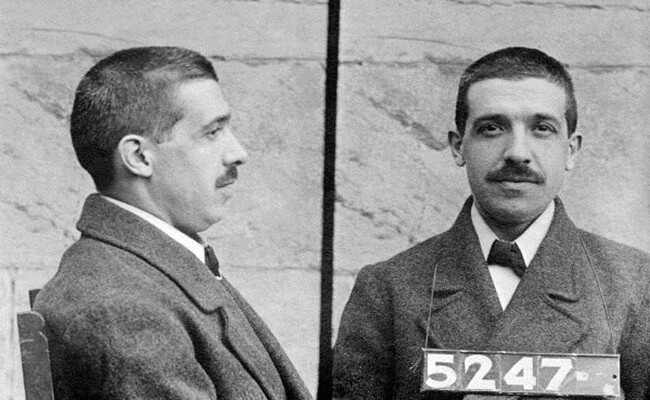15 Facts About Scam Pioneer And Scheme Namesake Charles Ponzi

Everybody loves a con man. Well, everybody that’s on the outside of the con. And when we look through some of the greatest cons in American history, one particular scam artist stands out. A man who became the namesake of an entire category of financial impropriety, to the point that it may have clouded who he actually was and what he actually did. That man is Charles Ponzi, the pied piper of people’s pocket money around the year 1920. Here’s 15 facts about the famous flim-flammer.
He Arrived In The U.S. With $2.50
Ponzi was born in Italy, but set off for America on the SS Vancouver, and when he arrived in Boston, he had only two dollars and fifty cents to his name. This is less because he was a poor immigrant following a dream, though, and more because he lost $197.50 of the $200 he left with while gambling on the boat.
He’d Been To Jail Before He Ever Invented His Scheme
Charles Ponzi didn’t exactly have a sterling record. Likely, if he’d tried to recruit investors in the age of Google, they would have quickly asked something like “Hey, are you the Charles Ponzi that spent 3 years in federal prison for forging checks?” (He was.) Though maybe I’m giving modern people too much credit.

OK, He'd Been To Jail TWICE
After being released from jail for bad checks, Ponzi looked to a different criminal area for employment–smuggling. He next starting sneaking Italian immigrants illegally across the border into the United States, presumably to steal hard-working Americans’ butcher shop jobs. He went to prison for 2 years after being caught.
He Was Five Foot Two
Not that it matters, but does it make his financial improprieties cuter knowing that he was just a tiny lil’ guy? A little bit? Financial impropriety short king?
He Got The Idea For His Scam From A Postage Stamp
The root of the scam that would ultimately make Ponzi rich, and later, very, very poor, was hatched when he received a letter from overseas including an “international postal reply coupon,” basically a voucher purchased in another country at a fixed price that could be exchanged for an American postage stamp.
The Basis Of His Scheme Was Viable… Sort Of
Ponzi realized that with the value of many European currencies going down versus the American dollar, these postal reply coupons could be purchased, sent, and then redeemed for an American postage stamp, which could then be sold at a profit. It was a tidy (and legal) scheme that could probably make some actual money–just not enough to scale and support millions of dollars worth of investments.
Investors Did Actually Make Money, At First
One thing that still makes these sorts of cons viable today is that as soon as people see someone else making money, that’s all the proof they need. This would later be labeled the phenomenon of “irrational exuberance” by Alan Greenspan. Telling investors that their money would bring them 50% interest in 90 days through the method described above, Ponzi did actually deliver on his claims to early investors. Of course, the money they received was just taken from later investors.
Ponzi Scheme = Pyramid Scheme
Some of the savvy know this already, but some may not: a pyramid scheme is simply a different name for a Ponzi scheme. This name does give a neat visualization of how the scam works, though. Since all owed interest is paid out from the next wave of investors’ money, the scheme requires more and more investors as it goes on to stay solvent, and since at first glance, everyone’s making money, it’s easy to find new rubes… until it isn’t.

So Many People Wanted In Police Had To Handle The Crowds
Like I said, when money’s seemingly up for grabs, there’s no shortage of people who want in. At one point, investors desperate to get in on what seemed to be free money (never a good sign) created such a commotion in front of Ponzi’s offices that they blocked traffic, and the police had to assist.
His Victims Crossed Class Lines
The liberal use of the word investors in this article may bring to mind cigar-chomping wall street types, or in a more modern sense, down-vested dickheads with an undercut, but the people taken in by Ponzi ranged from working immigrants to whales. All I’m saying is, if you ever want to commit historical fraud, just make sure it all comes out of billionaires’ coffers and you’ll get the Robin Hood treatment instead of unwelcome in an entire country.
He Didn't Really Invent This Con
In a greater sense, the scheme Ponzi ran has been around for centuries, with the phrase “robbing Peter to pay Paul” going back to the 14th century and describing the base of the scam. He wasn’t even the first person to run it in Boston–that honor goes to Sarah Howe, who ran a similar scam in 1879.
He Was Making $250k A Day
Through his wheeling and dealing as he participated in the most pernicious form of redistribution of wealth, he was raking in a considerable amount of income. He purchased a mansion, a bank (which, surprise surprise, didn’t last long) and was known for walking around town with gold-handled canes. Investment tip: don’t trust a guy that’s LITERALLY swinging a cane.

The Boston Post Brought Him Down, And Won A Pulitzer For It
The Boston Post at first published stories as googly-eyed as the rest about Ponzi’s remarkable profits, but as they delved further into him, they became, rightfully, suspicious. They began to run articles questioning his strategies, and government investigators were already starting to sniff around. To fight the bad press, and at the suggestion of his publicity agent, Ponzi opened his books to a government auditor. This was not a good solution, because as we know, his books were f**ked.
His Own Publicity Agent Ratted Him Out
William McMasters, the publicity agent who’d suggested the audit, maybe via starting to hear from the auditors that the numbers didn’t make any god damned sense, or just via collecting guilt, spoke to the Boston Post on the record, revealing Ponzi was “hopelessly insolvent” and alleging him to be probably $4.5 million in debt at a minimum. By this time, Ponzi’s office was busier than ever, for the worst possible reasons. Investors filled the streets, trying desperately to cash out. 10 days after the Post report, the audit would conclude. Predictably, all was not well. The auditor ultimately found Ponzi to be $7 million in the red. With that, Ponzi transitioned from the private sector to the public sector, by which I mean, he went to jail.
Even On His Deathbed, He Never Apologized
A quote attributed to Ponzi as he lay dying in a hospital in Brazil is as follows: “I had given them the best show that was ever staged in their territory since the landing of the Pilgrims!... It was easily worth fifteen million bucks to watch me put the thing over!”
Top Image: Public Domain/Pixabay